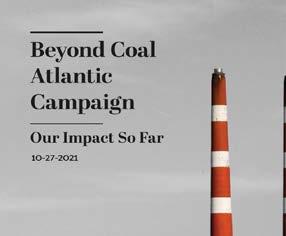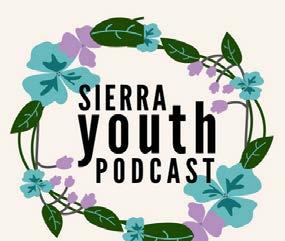
5 minute read
Taking Action in Atlantic Canada
Atlantic
From the Beyond Coal Impact Report
Advertisement
Sierra Club Atlantic Canada’s Beyond Coal campaign has established itself as a leading voice on energy issues and climate activism in Nova Scotia this year. With the commitments of successive NS Premiers to transition to 80 percent renewable energy and get off coal by 2030, we have a pathway to achieve our Beyond Coal campaign targets.
In New Brunswick Sierra Club Atlantic Canada created infographics and fact sheet on (Small Modular Reactors) SMRs, in partnership with Susan O’Donnell and CREDNB (Coalition for Responsible Energy Development in NB). We also joined a new caucus of New Brunswick Environmental Network focused on stopping public funding for SMR development (the federal government has already committed $55 million and the NB government $30 million). Additionally we hosted Decolonizing Book Club, guided by Mi’kmaw educator Chris George from the Eel River Bar First Nation, a doctoral student at the University of New Brunswick, his research focuses on Indigenous cultural and political resurgence. The online book club included participants from around the Maritimes.
In Newfoundland and Labrador Sierra Club Atlantic Canada’s focus has been to work in solidarity with Roberta Benefiel (Grand Riverkeeper Labrador) and the North American Megadam Resistance Alliance (NAMRA) to stop the Gull Island mega dam project. If built, the Gull Island Project would block the Grand River with a massive 300foot dam; flood 23,000 hectares of pristine boreal forest; and increase already dangerous levels of methylmercury in fish and wildlife, the traditional food source of Inuit and Innu people.
(continued from Atlantic)
Gretchen Fitzgerald, Sierra Club’s National Programs Director, and Roberta Benefiel led a sign-on campaign for a letter opposing the Gull Island project, which they sent to the Prime Minister and the premiers of Atlantic Canada on October 13.
Going forward, the Atlantic Chapter is aiming to focus even more on speaking directly to the public on key issues, “arming the reasonable” with the information and tools they need to better understand and fight climate change.

We are also working to foster new relationships with Indigenous and non-Indigenous allies and strengthen existing ones so that together they can build a movement in Atlantic Canada that can’t be ignored.
Prospect for New National Park in Edmonton Region Sparks Excitement Prairie
By Lindsay Boucher
This summer Johnathan Wilkinson, Former Minister of the Environment and Climate Change, announced a new program to create national urban parks across Canada. Seven cities were being considered, including the greater Edmonton area. This announcement aligns with Sierra Club Canada Foundation’s goal of providing access to nature for all, protecting wildlife and habitat, and mitigating climate change with nature-based solutions.
Sierra Club Canada Foundation (SCCF), in collaboration with the North Saskatchewan River Conservation Society and CPAWS-Northern Alberta, have high hopes bringing groups together in support of the creation of a national park in the Edmonton region.
“There has never been a better opportunity to advance creating a National Urban Park in the Metropolitan Edmonton Region,” said Dr. PearlAnn Reichwein, Edmonton National Urban Park Leader with Sierra Club Canada Foundation, noting that a national urban park program is a collaborative nature-based solution to many current and future needs as we aim toward the next century. “It’s about an investment in resiliency and connecting Canadians to nature in ways that have multiple benefits for a brighter future.”
Season One of Our Youth Chapter’s Podcast is Out, Listen Now!
Sierra Youth
may arise from acute environmental disasters or from experiencing the loss of land, species, or even bodies of water. It doesn’t have to feel hopeless though, and this podcast explores how we can use our personal experiences with grief to come together and build up our communities.
In episode 8, Where Have the Good Youth Gone?, the hosts talk with Ava Hedeker, the Founder and Editor-in-chief of F(earth)er Magazine. Together they discuss interdisciplinary environmentalism and how we can understand it from a youth’s perspective - leveraging the power of journaling, storytelling, and writing.
The Metropolitan Edmonton Region is at the convergence of the boreal and parkland bioregions. It sustains high biodiversity, including 27 species of fish, such as the threatened lake sturgeon, and corridors for wildlife such as deer and moose -- all within an urban, peri-urban, and farmland context. The region is also Treaty Six territory and the Homeland of the Métis Nation of Alberta. The region supports a metro populace of over a million and nearby municipalities on the watershed of the North Saskatchewan River, including a legacy of parks and protected areas.
Going forward, SCCF will work with Parks Canada and key stakeholders to encourage a national urban park that brings health, inclusion, and resiliency to the Edmonton Region, ensuring collaboration for environmental protection, and supporting Indigenous leadership and reconciliation.
Season 1 of our Sierra Youth chapter’s podcast is now available to listen to in full on spotify and apple podcasts. This first season takes a look at some of the most pressing issues facing our environment as well as the impact of environmental damage on people. Each podcast ends with a simple 10 minute action we can all take to make a difference.

Episode 12, So Many Radishes, So Little Time, takes a look at food sustainability and how our diet impacts the natural world. The hosts ask, and seek answers to important questions like how collective food consumption impacts the planet. They explore how we can fuel our bodies more sustainably and what systematic change in our food supply looks like.
Instead of endorsing a particular diet the hosts touch on our own relationships to food and how they have evolved over the years, and ultimately encourage their listeners to listen to your body and take care of it in a way that best fits them.

Episode 4 looks at ecological grief and how we can address it with catalytic action. Ecological grief is the grief that’s felt in response to experienced or anticipated ecological loss. It
There are a lot more episodes, exploring issues like logging at Fairy Creek, greenwashing, and reimagining our economy and society. Perhaps the biggest takeaway is that we have a lot of solutions to the challenges that we are facing. But we need action on those solutions now more than ever and Sierra Youth are leading the way. Find out how to join Sierra Youth here and become a podcast supporter at their Patreon here.
Quebec Chapter’s new project is for the birds

Quebec
Quebec Chapter (QC) has an illustrious history working to protect urban natural habitats. QC is partnering with the city of Terrebonne and environmental consulting firm TerraHumana Solutions in a new project. Their new project, supported by a grant from the Echo Foundation, will be a guide and training for municipalities to better protect bird habitat on their land.
Via this project, municipalities will be povided the resources to apply best practices, to alter or mitigate their necessary tasks, to reduce and avoid damage to habitats especially during breeding and brooding seasons. It sounds simple but guidelines on how and when to remove invasive plants or clear hydrolines contribute to municipalities becoming key players in the protection of birds, thus preserving biodiversity on their territory.
Celebrating Quebec Chapter’s 15th Anniversary
nuclear energy and radioactive pollution in the Chalk RIver area with a focus on the potential for federal political action. Many representatives of coalitions we work with attended. The conference day was aptly closed with a presentation by Louis Ramirez and Isabelle Grondin Hernandez titled Working together without exhausting oneself: best practices for working in an agile coalition.
Day two was a guided hike in Gatineau Park led by Michelle Page, an amateur mycologist. Partners Oxygene Club, the Mycologists amateurs of the Outaouais, Sierra Club Quebec, as well as the Friends of Gatineau Park enjoyed the day learning about edible and wild mushrooms. There was even a mushroom burger lunch for all participants.


